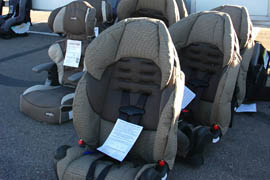Cronkite News has moved to a new home at cronkitenews.azpbs.org. Use this site to search archives from 2011 to May 2015. You can search the new site for current stories.
Doctors tout bill that would require booster seats for kids in cars
PHOENIX – The House Transportation Committee unanimously endorsed a bill Thursday that would require automobile passengers between the ages of 5 and 8 and under 4 feet 9 inches tall to use booster seats.
Arizona remains one of three states that don’t require booster seats despite the National Transportation Safety Board recommending such laws.
Current state law requires children age 4 and younger to be in car seats. After that, child passengers must be secured by a seat belt until age 16.
Experts say seat belts don’t fit optimally until children are tall enough, leaving kids at risk for serious injury.
“By not having the booster seat law, we are actually requiring parents to do something that may be harmful to their children,” said Rep. Nancy McLain, R–Bullhead City, author of HB 2154.
Similar legislation has failed repeatedly in recent years. McLain said she opposed to this bill last year but had a change of heart after speaking with a pediatrician.
“I had a conversion, if you will,” she said.
The bill would apply to vehicles carrying 10 or fewer people and manufactured in 1972 or later.
Dr. David Notrica, trauma medical director at Phoenix Children’s Hospital, told the committee that without a booster seat it’s easy for a smaller child to slip down, putting the lap belt on his or her abdomen during an accident. That can lead to internal injuries and spinal cord damage, he said.
“Properly restraining these kids by putting them in a booster–positioning seat will allow that seat belt to be much more effective,” Notrica said.
Sara Bode, a pediatrician representing the American Academy of Pediatrics’ Arizona chapter, said some parents don’t understand the benefits of booster seats, adding that statistics show the seats can reduce crash injuries by 60 percent.
“Parents think, ‘This doesn’t help much,’ but really that can save their (child’s) life,” she said.
Vic Williams, R-Tucson, the committee’s chairman, said it’s wrong for opponents to contend that a law would interfere with parental rights or constitute “nanny state-type government.”
“This is a role government needs to play a part in,” he said.







